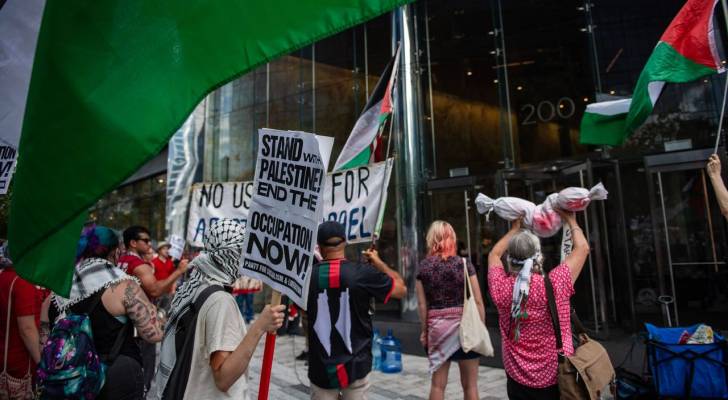Pro-Palestinian demonstrators bang pots and pans and bang on the entrance doors to the Boston Consulting Group (Credit: AFP)
Consultants quit 'Israel's' "deadly" Gaza aid project
Four consultants at Boston Consulting Group (BCG) resigned in the early stages of work on a controversial humanitarian project for Gaza, raising alarms that are now at the center of an internal investigation, according to the Financial Times.
The departures are being examined by WilmerHale, the law firm hired to probe what BCG itself has described as “process failures” surrounding its involvement with the Gaza Humanitarian Foundation (GHF). This 'Israeli'-backed food distribution network has drawn condemnation from aid organizations and the United Nations.
BCG acknowledged that senior partners overseeing the project “obfuscated” the reasons behind the resignations.
“Our involvement with the work in Gaza was the result of deliberate individual misconduct, including that the reasons for departures from the team were obfuscated,” the firm said in a statement. “We have launched a firm-wide effort to ensure our controls are not circumvented and to strengthen our speak-up culture.”
- Concerns from the start -
According to people familiar with the matter, three US consultants left the project just one day after joining in October, when BCG had been engaged pro bono by Orbis, a US security contractor working with an 'Israeli' think tank. The staff raised concerns over coordination with 'Israeli' authorities, among other issues.
The effort, internally referred to as Project Aurora, restarted with a new team from BCG’s US defense practice. But another consultant, a US military veteran, quit weeks later after being asked to outline risks associated with private security contractors and the project’s viability. The consultant left shortly after raising these concerns.
Investigators are now reviewing whether those early warnings were properly handled.
- Collapse of the project -
For seven months, BCG worked on establishing the GHF, which was designed to replace the UN’s central role in Gaza’s humanitarian response. The project was abruptly shut down in May, just before its official launch, after senior executives determined that the US partners in charge had bypassed internal approval procedures and misled superiors about the project’s scope and support.
Mainstream aid groups refused to back the GHF, accusing it of undermining humanitarian principles of independence. The UN labeled the initiative a “fig leaf” for 'Israeli' objectives. Distribution centers operated by the GHF did little to stem the food crisis in Gaza, and Palestinians attempting to reach aid sites have been killed in large numbers.
- Leadership fallout -
The scandal has rattled BCG’s leadership. In June, the firm fired the two partners who led the project. Two other senior executives, aware of the work, have stepped down from their management roles.
Chief executive Christoph Schweizer described the episode as “deeply painful and profoundly disappointing.” Several international aid organizations that previously collaborated with BCG have since suspended ties while awaiting the outcome of the WilmerHale review.
- Broader involvement in Gaza projects -
The Financial Times has reported that BCG also developed a financial model for 'Israeli' businessmen behind the GHF that included cost projections for relocating large numbers of Palestinians abroad, including to Somalia.
Beyond the GHF, BCG pursued other Gaza-related work after the war began. This included advising Fogbow, a company founded by US veterans, on a plan to send aid shipments by sea from Cyprus. The firm also pitched UNRWA, the UN’s Palestinian refugee agency, on support for organizing relief operations and fundraising, though no contract was signed.
BCG maintains it is committed to being apolitical and to adhering to humanitarian principles. The firm said the two former partners falsely represented that the GHF had broad international backing and had established internal “guardrails," including barring staff from Gaza travel and excluding Middle East and 'Israeli' offices from the project.




